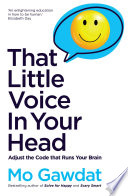

The book begins by delving into the concept of the inner dialogue, or that little voice in your head, which influences thoughts, emotions, and actions. This voice can be a source of motivation or self-doubt, and understanding its nature is crucial for personal development. The author emphasizes that recognizing this inner dialogue is the first step toward mastering it. By becoming aware of the patterns and themes in our self-talk, we can begin to challenge negative thoughts and replace them with constructive ones. This awareness leads to greater emotional intelligence and resilience, enabling individuals to navigate life's challenges more effectively.
Continue readingMindfulness is presented as a powerful tool for managing the inner voice. The book discusses various mindfulness techniques that help individuals stay present and focused, reducing the impact of negative self-talk. Through practices like meditation and conscious breathing, readers learn to observe their thoughts without judgment. This detachment from the inner dialogue fosters a sense of calm and clarity, allowing for better decision-making and emotional regulation. The author provides practical exercises to incorporate mindfulness into daily routines, illustrating its transformative effects on mental health and overall well-being.
Continue readingOne of the central themes of the book is the importance of reframing negative thoughts. The author explains that our inner voice often perpetuates limiting beliefs and fears, which can hinder personal and professional growth. By identifying these negative thoughts and consciously reframing them into positive affirmations, individuals can shift their mindset. The book provides techniques for cognitive restructuring, encouraging readers to challenge their assumptions and replace them with empowering beliefs. This practice not only enhances self-esteem but also opens up new possibilities for success and fulfillment.
Continue readingSelf-compassion is explored as a vital aspect of personal development. The author argues that many individuals are overly critical of themselves, which exacerbates negative inner dialogue. By cultivating self-compassion, readers learn to treat themselves with the same kindness and understanding they would offer a friend. The book outlines strategies for developing self-compassion, such as practicing gratitude and embracing imperfection. This shift in perspective fosters a healthier relationship with oneself, reducing anxiety and promoting resilience in the face of challenges.
Continue readingThe book emphasizes the importance of setting clear goals and using visualization techniques to manifest desired outcomes. The author explains that the inner voice plays a crucial role in goal achievement, as it can either support or sabotage one's ambitions. By creating a vivid mental picture of success and articulating specific, measurable goals, individuals can harness the power of their inner dialogue to propel them forward. The book provides step-by-step guidance on effective goal-setting strategies and visualization exercises, empowering readers to take charge of their futures.
Continue readingThe author highlights the significance of surrounding oneself with a positive support system. The inner dialogue is often influenced by external factors, including the people we interact with. By fostering relationships with supportive and encouraging individuals, readers can enhance their inner voice and create an environment conducive to growth. The book discusses the importance of seeking out mentors, friends, and communities that uplift and inspire, and offers practical tips for building and maintaining these connections. This supportive network serves as a buffer against negative self-talk and reinforces positive beliefs.
Continue readingThe final idea presented in the book is the concept of continuous growth and lifelong learning. The author argues that embracing a growth mindset is essential for overcoming the limitations imposed by the inner voice. By committing to personal development and seeking new knowledge and experiences, individuals can expand their horizons and challenge their inner critic. The book encourages readers to adopt a proactive approach to learning, whether through formal education, self-study, or experiential learning. This commitment to growth not only enhances self-awareness but also fosters resilience and adaptability in an ever-changing world.
Continue readingThe reading time for That Little Voice In Your Head depends on the reader's pace. However, this concise book summary covers the 7 key ideas from That Little Voice In Your Head, allowing you to quickly understand the main concepts, insights, and practical applications in around 22 min.
That Little Voice In Your Head is definitely worth reading. The book covers essential topics including Understanding the Inner Dialogue, The Power of Mindfulness, Reframing Negative Thoughts, providing practical insights and actionable advice. Whether you read the full book or our concise summary, That Little Voice In Your Head delivers valuable knowledge that can help you improve your understanding and apply these concepts in your personal or professional life.
That Little Voice In Your Head was written by Mo Gawdat.
If you enjoyed That Little Voice In Your Head by Mo Gawdat and want to explore similar topics or deepen your understanding, we highly recommend these related book summaries:
These books cover related themes, complementary concepts, and will help you build upon the knowledge gained from That Little Voice In Your Head. Each of these summaries provides concise insights that can further enhance your understanding and practical application of the ideas presented in That Little Voice In Your Head.